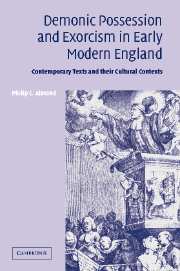 Demonic Possession and Exorcism in Early Modern England
Demonic Possession and Exorcism in Early Modern England Published online by Cambridge University Press: 22 September 2009
When A brief Narration was published in 1598, the exorcist John Darrell and his colleague George More had been convicted of counterfeiting, were ‘deposed from the Ministry, and committed to close prison’, awaiting sentencing. George More was to die in prison. John Darrell was out of prison but in hiding some two years after. Darrell had been convicted, upon the word of William Sommers, that he had taught Sommers how to counterfeit possession when Sommers was a young man of around nineteen or twenty years of age.
A brief Narration is the first of thirteen works, the publication of which was motivated by the case of Sommers and the trial of Darrell. It begins with an editorial introduction by a George Cole, written after the trial of Darrell. A narrative account of the possession of William Sommers is followed by a series of arguments for the genuine possession of Sommers against reasons to the contrary which were written between the Archbishop of York's Commission in March 1598 and Darrell's trial in June of that year. These two sections may have originally come from the pen of John Darrell in prison. The text concludes with a number of depositions given at the York Commission by witnesses to Sommers' behaviour as a demoniac.
Because of the large number of texts around the story of William Sommers, and the controversy surrounding the case, it is difficult to construct the story. But the broad outline in A brief Narration is consistent with other accounts.
To save this book to your Kindle, first ensure no-reply@cambridge.org is added to your Approved Personal Document E-mail List under your Personal Document Settings on the Manage Your Content and Devices page of your Amazon account. Then enter the ‘name’ part of your Kindle email address below. Find out more about saving to your Kindle.
Note you can select to save to either the @free.kindle.com or @kindle.com variations. ‘@free.kindle.com’ emails are free but can only be saved to your device when it is connected to wi-fi. ‘@kindle.com’ emails can be delivered even when you are not connected to wi-fi, but note that service fees apply.
Find out more about the Kindle Personal Document Service.
To save content items to your account, please confirm that you agree to abide by our usage policies. If this is the first time you use this feature, you will be asked to authorise Cambridge Core to connect with your account. Find out more about saving content to Dropbox.
To save content items to your account, please confirm that you agree to abide by our usage policies. If this is the first time you use this feature, you will be asked to authorise Cambridge Core to connect with your account. Find out more about saving content to Google Drive.